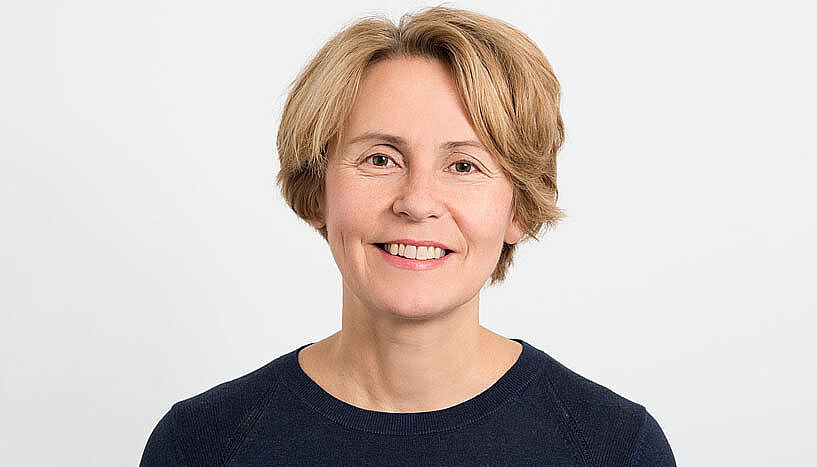Tarja Knuuttila: "Philosophy is my calling"
| 23. Mai 2019
Since August 2018, Tarja Knuuttila has been professor of Philosophy of Science at the Department of Philosophy. In the same year, she received an ERC Consolidator Grant. (© University of Vienna/Barbara Mair)
The philosopher Tarja Knuuttila has received an ERC Consolidator Grant for her project "Possible Life: The Philosophical Significance of Extending Biology". Over the next five years, she will explore the field of synthetic biology and astrobiology through a combination of philosophical and empirical work.
uni:view: You have been professor of Philosophy of Science at the University of Vienna since 2018. In 1991, you completed your studies in Economics and Business Administration. How did you find your way to philosophy?
Tarja Knuuttila: I got interested in philosophy as a direct result of my economics studies. Economics is similar to natural sciences in the sense that you work with mathematical and statistical methods and models. My original problem was that many economic models make assumptions that do not actually prove to be true in reality. When I took a course in philosophy of science at the end of my economics degree, I found out that other disciplines discuss exactly the same problem. So I got a name for my problem: idealisation. This was the beginning of my big philosophical journey.
uni:view: So you switched to philosophy?
Knuuttila: More than ten years passed before I started to write my PhD thesis in philosophy, because I got kids and had to work to pay back my study loans. I worked, using the skills I had acquired during my studies in economics and business (including accounting – mostly for non-profit organisations), and studied philosophy. That was my calling.
uni:view: As a philosopher of science, what are you mainly interested in?
Knuuttila: Personally, I think that science is too much discussed in terms of philosophers’ ideas and theories. I am much more interested in the actual tools that scientists use, such as models. Nowadays I am convinced that my original question of how realistic models are was partially mistaken. In most cases, you simply cannot have realistic models, so the question rather is how models are being used and to what ends. What do economists think they can learn from these kinds of constructions?
This leads to my ERC project "Possible Life: The Philosophical Significance of Extending Biology": To me, what seems to be at the core of modelling is the study of various kinds of possibilities. In this project, we explore what is possible for life by studying synthetic biology and astrobiology. For example, how does synthetic biology, in constructing new biological parts and systems, give us biological knowledge that we might not have gained through studying actual evolved organisms only.
The funding of pioneering basic research is one of the priorities of the European Union. To this end, the European Research Council (ERC) was established. To receive support, research projects must have a high potential for innovation. Since 2007, 53 ERC grants have already been awarded to researchers of the University of Vienna: 14 Advanced Grants, ten Consolidator Grants, 26 Starting Grants and three Proof of Concept grants. ERC Grants at the University of Vienna
uni:view: In your ERC project, you work together with biological laboratories. In what way?
Knuuttila: The ERC project focuses on different topics: the basic elements of life, biological circuitry, synthetic life, evolutionary innovations and finally, the habitability of exoplanets, which relates to astrobiology. For all these topics we collaborate with one or two European or US laboratories which are established and acknowledged in their field and do empirical research. This includes participant observation and interviews with the researchers. However, the primary objective is not to study the scientists and their laboratories, as sociologists would do, but rather to understand the aims and methods of their research and their results. For me it is important to look at the processes of how models are constructed in scientific practice.
uni:view: How is your ERC project structured?
Knuuttila: The project is divided into two parts that focus on scientific and philosophical questions respectively. In the scientific part, we observe and examine those areas within contemporary synthetic biology and astrobiology that seem most promising for exploring possible life. For example, we will be studying synthetic genetic circuits, the possibility of synthetic life and the question of whether life could be based on genetic alphabets other than DNA that would nevertheless be able to carry and transmit genetic information.
Then we have our philosophical work that turns our study of scientific research into a resource for philosophical reflection and theorising. Here, we try to understand how models are being used to conceive different possibilities, and whether biological systems could be multiply realisable. Finally, we investigate biological modalities. We study biological research from the perspective of different notions of possibility, necessity and contingency.
uni:view: Finland, the USA and now Vienna. How come?
Knuuttila: I am originally Finnish and worked at the University of Helsinki for a long time. When I was appointed as associate professor at the University of South Carolina in 2013, I actually thought I would stay in the US, partly because it is a big academic market and I also enjoyed the warmth of the US South. But for various reasons, I wanted to come back to Europe.
I was mainly thinking of Finland and Sweden, but was nothing short of thrilled when I was offered this appointment at the University of Vienna. This was my one-time opportunity to do something new. Vienna is an amazing city and – being home to the Vienna Circle – also a special place for a philosopher of science. In addition, the Department of Philosophy is big and friendly.
uni:view: We have talked a lot about your research interests, so let us focus on teaching. What is important for you to teach your students?
Knuuttila: I really want to nurture the interest in contemporary scientific research and enable students to reflect about it in a critical manner. I encourage my students to read scientific articles and watch videos of scientists who talk about what is happening in their fields in their own words. Science from every field is something that students can understand at least to some degree. I am so excited about science and philosophy of science myself, and I would like to share that with my students.
uni:view: Thank you for the interview. (td)
Tarja Knuuttila has been professor of Philosophy of Science at Department of Philosophy at the University of Vienna since August 2018. In 2018, Knuuttila received an ERC Consolidator Grant for her project "Possible Life: The Philosophical Significance of Extending Biology". The project will run until 2024.
Tarja Knuuttila's inaugural lecture "Scientific Models: Representations, Fictions and/or Artefacts?" takes place on 3 June 2019 at 5 p.m. in the Main Ceremony Chamber (Großer Festsaal), University of Vienna, Universitätsring 1. Invitation to the inaugural lecture (PDF)
Downloads:
Tarja-Knuuttila-Einladung_01.pdf
Dateigröße: 674,05 KB



